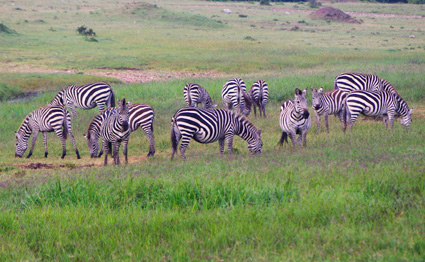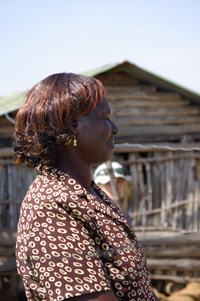A Kenyan Diary: Of Elephants, Maasai Warriors and Empowered African Women and Children

Day Three: It’s optional, but such a delightful start to every day: An early morning walk in the savannah just outside the Bogani compound with a Maasai warrior. This morning as the sun peaks over the eastern horizon, we see a harem of zebras grazing near a ridge, along which small children in their school uniforms walk to school, shouting “jambo” (Swahili for hello) to us as they pass by. Some of them walk for one or two hours to get to school. Their eagerness and appreciation for an education is an almost palpable emotion that is contagious, not just among other children but spreading into the hearts of each of us, the Canadian visitors.
After breakfast, we pile into Land Rovers again for a visit with the Kipsigis mamas at Emori Joi. We walk through the farming community with Mama Jane, a tall, elegant 50-year-old woman who proudly shows us her beehives. The beehives have provided her with honey and a source of income. Through its Adopt a Village program, Free The Children (FTC) provides holistic and sustainable infrastructure to the developing communities in which they work. Its program is based on four pillars, in which FTC believes is important with helping to end a cycle of poverty within a community: education, healthcare, clean drinking water and sanitation, and alternative income generating projects. Mama Jane’s beehives provide her alternative income to add to the family’s meager income derived from their farming efforts.

With the money from her beehives, Mama Jane has built a new brick home. She beams as she shows off her new solid home and compares it to her original hut, which she now uses as a kitchen. She explains that FTC has taught her and her women’s group the seven indicators of a healthy home: a kitchen garden; washing stations for hands; a sanitary toilet facility; a bathing place; a wire to hang washing to avoid the clinging bugs; a place to burn litter; and a dish drying rack out in the sun. Jane has incorporated all of these into her home.
Next, she plans to build a chimney in the home. Most of the Kipsigis live in a one-room round hut where they cook their meals, eat and sleep. With no chimney for ventilation, many suffer from respiratory problems. Mama Jane explains that in her old hut, she slept with her husband and three children in the same room with their chickens, dogs, cats and goats. No wonder she loves her new brick house! It’s gratifying to listen to this empowered woman’s story of success and realize the effect FTC’s Adopt a Village program has had.
As part of the clean drinking water and sanitation pillar in the Adopt a Village model, FTC has dug wells and built water tanks at schools and in the communities to provide safe clean water. Mama Jane takes us on a long trek to the Mara River to show us where women used to have to come five or six times a day to fetch water in 20-litre jerry cans. Some of us load the jerry cans on our backs, securing them with ropes that twine around our foreheads. Not an easy task.
Marc Kielburger, co-founder of Free The Children (freethechildren.com)and Me to We (metowe.com) explains on our way back to Bogani that the women, given the opportunities they received to improve the water and sanitation aspects of their homes and lessons learned in micro finance, have complete control of the family finances now. The men in the community, which we observe in our travels, do not seem to have the same work ethic as the women. Most of them we see sitting outside shanty-like bars along the road. Marc explains that because they no longer hunt (killing wild animals, especially lions, is illegal) or fight off other tribes who come to steal livestock (tribes now live peacefully together), they have lost their pride and sense of purpose. Alcoholism among men is a serious problem in this region of Kenya.
With the Mamas banding together as a group and learning about micro finance from FTC and becoming entrepreneurs, they now control the family’s money, a responsibility once held by the men. After lunch, we visit the Baraka Medical Clinic and Medicinal Garden, which serves more than 40,000 community members. We are invited to roll up our sleeves and help build a new maternity ward on the property. The tools are primitive and the work is hard, but there’s a sense at the end, that we’ve contributed some brawn and sweat to a much needed service in Kenya.
At dinner on the platform, we sip wine and enjoy the sun setting over the savannah. Dinners at Bogani are simple comfort foods with lots of local vegetables. Each of us shares our highlight of the day after dinner and truthfully, what we really share as a group is a sense of awe at the appreciation and big smiles of hope and warmth these Kenyan children and Mamas have offered us.
Many nights feature entertainment and tonight we are mesmerized by the Kenyan Boys Choir, a group of boys from various backgrounds and tribes who performed at Barack Obama’s inauguration. A perfect ending to the day.
For more information about booking this meaningful travel adventure, visit www.meritvacations.com or call 1.866.341.1777.
-Bonnie Baker Cowan
Guests of a Me to We Trip to Kenya are treated to a unique African experience of being immersed in the daily life of a fascinating culture. Me to We is an innovative social enterprise that supports the important work of its partner, Free The Children, an educational partner and international charity committed to providing holistic and sustainable infrastructure to developing communities around the world. Me to We donates half of its net profit to Free The Children, while reinvesting the other half to grow the enterprise and its social mission. In a five-part diary series, Bonnie Baker Cowan recounts the impressions of the Kenyan way of life, particularly in its rural and underserved communities and the work Free The Children is doing to help people break the chain of poverty.